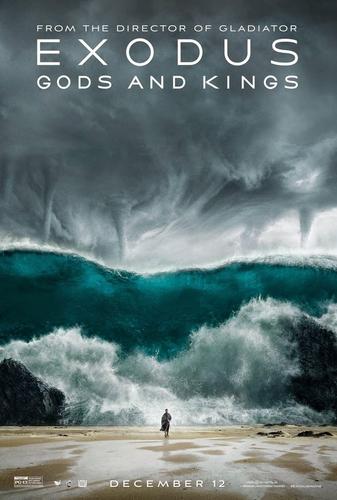Movie Review: Exodus: Gods and Kings

Source: 20th Century Fox
Sadly, the film delivers on neither.
First, the relationship between Moses and Ramses. The movie attempts to tread familiar ground in the form of sibling rivalry. Ramses, the promised heir, is a boy in a man’s body, less talented and less capable than his brother Moses, who is smart, talented and the one whom their father, Pharaoh Seti, trusts more. But rather than spending time developing that complicated relationship, we are meant to understand their dynamic by a few unconvincingly delivered lines in two or three scenes at the beginning, with their relationship never being given time to develop during the rest of the movie. Where as Cecile B. DeMille’s 1956 classic The Ten Commandments melodramatically oversold that rivalry, Exodus disappointingly undersells it.
So onto the epic showdown between God and man—or rather, the lack there of. It’s a bit of a mystery to me how the most compelling aspects of the Exodus story from the Bible could be completely stripped from a movie made during the height of the billion-dollar business of superhero blockbusters. I’m referring to God’s spectacular intervention through Moses in the form of devastating plagues on the people of Egypt—you know the ones: water into blood, frogs, flies, pestilence, hail, etc. etc. all leading up to the big one: death of the firstborn of Egypt.
Oh, it’s not like they aren’t in the film at all, on the contrary: each one is indeed depicted—as natural phenomena on steroids. I’ve read the explanations of the plagues logically following on from one another before, and they even make sense to me as a possibility of how things went down. But instead of allowing the plagues to serve as dramatic punctuation marks, ratcheting up the conflict between the self-proclaimed god Ramses and the true God of Israel—as the biblical narrative does—these are nothing more than neat computer generated effects, one right after another in a montage of discomfort for the Egyptians. Worse still, Moses has literally no part in communicating that the plagues are coming or being an instrument to mark their beginning. As I said, he and Ramses don’t interact much face-to-face. (Not to be completely negative on the plagues; I was very impressed by the very accurate portrayal of the parting of the Red Sea, as well as a tastefully subtle depiction of the Passover plague itself.)
Now, none of this is to give the impression that God is completely absent from this film. Intriguingly, Mr. Scott chose to personify God as a little boy, whom Moses has conversations with face-to-face. Many would object to this outright as belittling to God, or perhaps as an outright willful breaking of the second commandment—and indeed, it’s something I’d never attempt if I were retelling this story on film. That said, I find the idea of making God into a character that can be developed on-screen, that can interact with other characters in order to develop those relationships, and which the audience can relate to on a human level, interesting. Once again, though, the movie lets us down on, failing to deliver on any of those potential gains. None of the interactions Moses and the boy have allow us to relate to either character better, no less help to develop their relationship into anything as time goes on.
How does Exodus compare to that other major Hollywood film to tackle a traditional Bible story this year—the Darren Aronofsky-directed Noah? Both movies are thoroughly modern reinterpretations of classic biblical stories. Both draw on extra-biblical themes. Both are products of modern biblical criticism and secular humanism, which treat the Bible as just another religious text from the ancient world. So it should be no surprise to anybody that both fail to deliver on accuracy and that both movies replace the spiritual lessons of the biblical narrative with new/different lessons. As far as that goes, though, at least the bizarre Jewish Gnosticism that Noah drew on gave us some weird but neat entertainment (spirit beings trapped in weird rock creatures? sure, ok, whatever; weird, but at least neat). Exodus, on the other hand, replaces the powerful spiritual involvement of God with nothing more than empty modern shallowness, reducing God to a boy, reducing Moses’ role as his chosen servant/messenger to an unwilling bystander, and taking away from us the possibility of seeing a sweet pillar of fire rendered in glorious 4K 3D.
Sadly, I came away from Exodus being disappointed in nearly every way. If Ridley Scott had delivered on just one of my two major expectations of the film, perhaps I’d have been able to glean more good. But instead of a modern epic blockbuster with incredible visual effects of amazing supernatural events—or a consequential look at the deeply human dynamic at play between two powerful brothers in a changing relationship—what we get is a vain and frivolous blockbuster pretending to be something it isn’t.
No comments:
Post a Comment